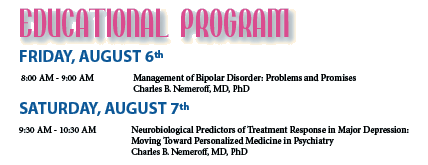This is a piece captured from the brochure of the Summer 2010 CME Meeting of the Georgia Psychiatric Physicians Association. being held in Ponte Vedre Florida in August. Unless I missed something, there are no disclosures on the Web Site about the speaker’s affiliation with Pharmaceutical Companies. A friend sent me the link with note predicting that my mouth would drop open. My mouth didn’t disappoint!
June 21, 2010Some say the incident in which the director of the National Institute of Mental Health (NIMH) assured the University of Miami’s medical school dean if he hired Charles Nemeroff, MD the disgraced researcher, Nemeroff could still pull in government grants is an example of the Old Boy’s Network. NIMH director Thomas Insel, MD assured Pascal Goldschmidt, MD, UM’s medical school dean that Nemeroff ‘s Congressional investigation for unreported drug industry income and NIH’s termination of his $9 million grant shouldn’t stop the government funding spigot – even as Insel personally revised NIMH’s "conflict of interest" rules [And even as Nemeroff serves on two NIH peer-review advisory panels that decide what? Who receives grant money?].
Insel presumably "owed" Nemeroff because the former head of psychiatry at Emory got Insel a gig there when he lost his NIH position in 1994 and helped Insel’s comeback in 2002 as NIMH director, says the Chronicle of Higher Leaning. Nice revolving doors if you can catch them. But others say it’s an example of the Old Girl’s Network since it was UM President Donna Shalala, former Health and Human Services secretary, who allowed the hiring of the poster boy for conflicts of interest without a job posting, national search, search committee or vote from UM psychiatry faculty.
Nor was Sen. Charles Grassely (R-Iowa), whose investigations found Nemeroff failed to disclose $1 million in drug industry income while doing "impartial" government research, amused by a Goldschmidt quote in the Chronicle that dismisses a freeze on Nemeroff-initiated grants at Emory as due to "political pressure"…
To further Goldschmidt’s ambition to make the University of Miami "a destination facility, attracting patients from Latin America and the United States, just like Mayo and Cleveland clinics," according to the Herald, UM bought a private hospital, two new research buildings and hired hundreds of new medical school faculty members in a $1 billion spending binge some call shadowy. It bought Cedars Medical Center, now University of Miami Hospital, from The Healthcare Company – a firm convicted of Medicare and Medicaid fraud in 2003 – for $270 million though the facility only earned $987,000 in profit during its last year. And questions about double-billing the government for patients UM clinicians see at the public Jackson Memorial Hospital swirl.
Nemeroff’s department also oversees UM Behavioral Health’s multi-million dollar Medicaid contract which embraces 900 providers, 30 hospitals and 100 community mental health centers, despite his track record with Health and Human Services. Meanwhile new faculty recruits have left abruptly, major donors have rescinded gifts and moral at the medical school is at an all time low.
Of course Nemeroff’s hire as head of UM psychiatry looks like an unvarnished ploy to divert taxpayer dollars from the $1.4 billion NIMH budget to a private institution courtesy of I-scratch-your-back-you-scratch-mine cronyism. But it also raises questions about how government officials trusted with public funds even got there.
"There has always been some confusion… about whether Yerkes [Yerkes National Primate Research Center] is part of Emory or part of the federal government," Insel told Emory magazine as he hop-scotched between the two employers with the help of his buddy Nemeroff [doing Lord knows what to 3,400 primates]. "This is not in any way, shape, or form a federal laboratory. . . . It is, from top to bottom, part of Emory. Every brick, every animal in this place, is part of Emory University." No kidding. It is just this "confusion" between public and private monies – the Yerkes Center is NIH funded, hello? – that earned Nemeroff his ethical cloud and now Insel’s support of him as UM financial savior.

[…] At that time, Nemeroff wrote: By this summer, Dr. Nemeroff was the featured speaker at the Georgia Psychiatric Physicians Association Summer C.M.E. meeting. Now we learn that he is back at the top of the C.M.E. circuit in an April […]